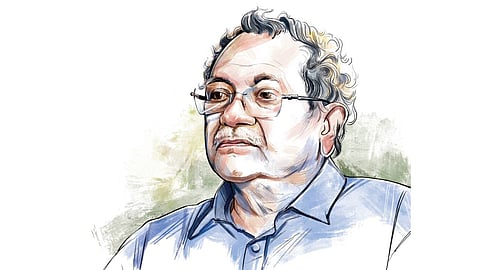

THIRUVANANTHAPURAM: The setting is quite in keeping with the dim-lit, aesthetic and poignant frames that Shaji N Karun’s camera generated. The stage was set for acquaintances, some who worked with him over the years, and others who knew him as an auteur who minted magic from the world of reality.
To filmmaker and film archivist Shivendra Singh Dungarpur, Shaji was the mentor he could call up for any advice. Their familiarity dates back to Dungarpur’s student days at the Film and Television Institute of India (FTII). The bond deepened when Dungarpur shot Celluloid Man, a documentary on veteran archivist P K Nair.
“It was my first interaction,” says Dungarpur, who went on to restore two of the movies Shaji worked on as a cinematographer — Kummatty and Thampu. “Both those movies bore his stamp so much that I would say Aravindan’s brilliance as a director shone forth due to Shaji’s camera work. The films lived in his frames; they spoke the story emphatically,” he notes. But, what he would miss the most is Shaji’s guidance, the way he was hand-held during a workshop on film preservation that he organised last November.
Dungarpur wants to explore ways to preserve Piravi, Shaji’s directorial debut that bagged several awards. The film’s originals are lost but Shaji himself has spoken of copies preserved at the Fukoka Archives in Japan. “We need to look into it,” says Dungarpur, excusing himself to mourn his friend and mentor.
For Girish Kasaravalli, his recollections of Shaji are from their student days at FTII, where Shaji was one year his senior. “His room at the hostel was next to mine and every morning, I would go to him for coffee powder. We became good friends. He was respected even then for his aesthetics.
Later, they got translated into mesmerising frames that have defined cinematography in India. Plots came alive in his frames that spoke the theme of movies — brilliantly and silently,” he observes. “I began admiring him as a director too, after watching Piravi. It showed his full calibre,” Kasaravalli says.
The Kannada veteran met a “fragile” and “frail” Shaji at the International Film Festival of Kerala (IFFK) last December. “Malayalam cinema owes a lot to him,” Kasaravalli notes.
Music composer Sreevalsan J Menon, who worked on two of Shaji’s movies — Swapaanam and his final directorial venture Olu — feels the filmmaker had aesthetics that were way different from others. For his friends and associates, Shaji will always remain a pleasant memory; his demise an irreplaceable loss. But they take comfort in the certainty that his legacy will live on.